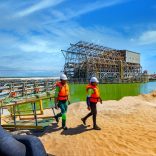Mozambique: Kenmare Resources says on track for 2025 production guidance
Palma: Indication of possible resumption of activities shows TotalEnergies has not abandoned LNG investment

File photo: Reuters
- Analysts say the company could renegotiate with Maputo
The resumption in the next 18 months of the liquefied natural gas project in Cabo Delgado is seen, in some quarters, as a sign that TotalEnergies has not abandoned its billion-dollar investment in Mozambique.
The announcement regarding the resumption of this project, interrupted following the jihadist attack on the town of Palma in March of this year, was made by the President of the African Development Bank, Akinwumi Adesina.
But his prediction is seen as excessive.
Total’s project entails various gains for Mozambique, not only in terms of employment, but also in terms of fiscal contribution and in attracting foreign direct investment, and for some currents of opinion, the delay in restarting activities in Afungi is not a win-win situation for the country.
In addition, this delay will also have serious implications for the project’s execution schedule, and with this delay, all the other variables that were expected for the following years are also compromised.
Read: TotalEnergies Mozambique LNG project may resume within 18 months: AfDB
Extractive sector uncertainties
And the fact that the forecast for the resumption of the project mentions a year and a half means that uncertainties remain not only in the extractive sector, but also in the economy in general, since a large part of the budget projections are made taking into account the implementation of the Rovuma project.
“In any case, it is already positive to have this indication that the project will be resumed, because it was not known whether Total would return or not,” Professor Custódio Dias said.
Some economists understand that “this delay has many implications, especially from an economic point of view, because it influences the country’s financial ranking, as Total’s project is one of the largest in Africa; and there are implications with regard to revenue collection and the dynamics of the province of Cabo Delgado, where the project is located, and of the country in general”.
Renegotiation?
Others say that a year and a half is a long time, especially given the efforts being made to restore security conditions, and they see this as a way for Total to force the government to renegotiate the terms of the contract.
Economist and researcher at the Centre for Public Integrity (CIP), Inocência Mapisse, says that the attack on Palma has posed challenges for Total, which the company will have to face, “and one of the ways that this type of companies uses is to renegotiate the terms of the contract, and the tax area has been one of the most affected in these renegotiations”.
Mapisse says that, in any eventual renegotiation of the contract, the government should eliminate some of the excessive tax benefits that it gives to multinationals, allegedly to attract investors.
Economist João Mosca agrees, and says that Mozambique has good gas reserves, “and, certainly, investors will come with fiscal policies similar to those practised in other countries”.
“It is possible to apply certain levels of fees, as long as this ensures that for the company to pay these fees, it maintains comparative advantages in gas exploitation, in relation to other sites, because there are more liquefied gas deposits [around the word] which are not being exploited,” Mosca argues.
TotalEnergies has not yet commented on when it is likely to return to Palma, and sociologist João Feijó says that, given the circumstances in which it suspended its activities, it is not expected to return soon.













Leave a Reply
Be the First to Comment!
You must be logged in to post a comment.
You must be logged in to post a comment.